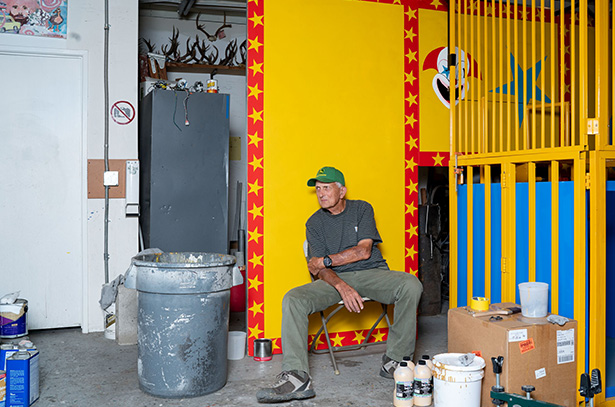
Richard Jackson Works With Books
20 Mar - 6 Jun 2021
Los Angeles
‘Paint every page of each book, while still wet stack the books filling a room, wall to wall, floor to ceiling.’
–Richard Jackson, 1977
About
About the Presentation Beginning in the early 1970s, lifelong Californian Richard Jackson’s Wall Paintings, Stacks, and Room-themed installations gave rise to a series of landmark innovations in painting, sculpture, performance, installation, and the relations between them.
Jackson’s interest in the larger possibilities of artmaking and how it can be done extends to books, as well. Organized by Dagny Corcoran, a longtime friend of Jackson’s and author of the expansive chronology in Hauser & Wirth Publishers’ 2020 monograph on the artist, this Book & Printed Matter Lab presentation highlights Jackson’s artist’s books and supporting archival material, displaying the artist’s preoccupation with the ambiguous requirements of codex, content, format, and purpose of a publication.
Below is a playlist created by Chris Kidd, author and dear friend of Jackson's, as the aural backdrop for the presentation. An eclectic selection of the obscure and eternal, interspersed with nods to Richard's longstanding love of opera, this playlist encapsulates the life and career of an artist who has never been bound by easy categorization.
Photo: Richard Jackson in front of ’Big Ideas (1000 Pictures),’ Rosamund Felsen Gallery, Los Angeles CA, 1980
About the Artist

A pre-eminent figure in American contemporary art since the 1970s, Richard Jackson is influenced by both Abstract Expressionism and action painting, exploring a performative painting process which seeks to extend the potential of painting by upending its technical conventions. Born in Sacramento, California in 1939, Jackson first came to international attention with a major presentation of his installation works at the Menil Collection, Houston, in 1988, followed by the 1992 exhibition, ‘Helter Skelter,’ at the Los Angeles Museum of Contemporary Art.Jackson’s work is process-oriented, and the structural aspect of his installations involves a high level of craftsmanship and engineering. However, the final application of paint is generated through an automated process which Jackson calls ‘activation.’ He equips his ‘painting machines’ with a network of pipes and hoses which, when deployed, cause violent eruptions of paint that immerse the work and surrounding area. The finished installations remain in the aftermath of this extreme and unpredictable performative action.
Jackson responds to the high-mindedness of painterly practice by repositioning painting as an everyday experience. For Jackson, paint is not a tool used to create a representational image, but is used as a ubiquitous liquid which is spurted, splattered and sprayed over the surface of his installations.
He draws on the visual lexicon of domestic environments, universal basic human activities, and hallmarks of the quintessential American life such as hunting and sports. By harnessing this imagery and combining it with a physically laborious and conceptually rigorous artistic practice, Jackson has produced a body of work that questions and challenges the structure of the art world at large for over four decades.
Current Exhibitions
1 / 11










